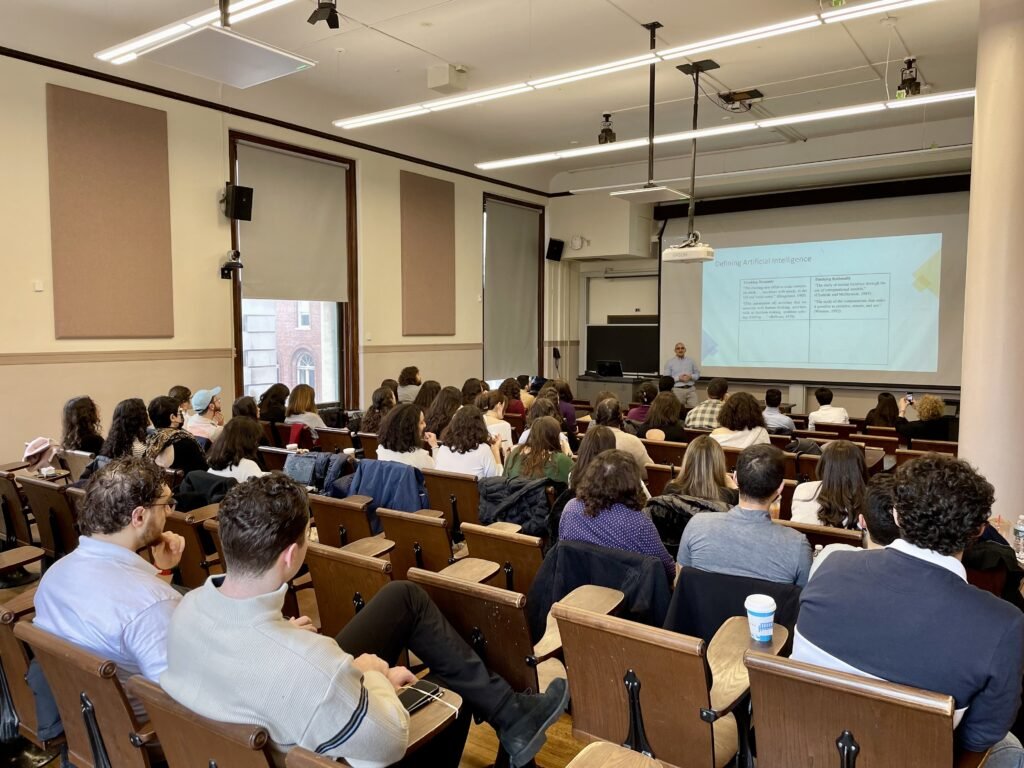
NEW YORK, NY—Following a two-year virtual hiatus due to the COVID-19 pandemic, the Norian Youth Connect Program (YCP) returned in-person on Saturday, allowing university students and graduates from throughout North America to kick off the month with meaningful learning, immersive discourse and professional networking. Organized by the Armenian Relief Society (ARS) of Eastern USA, with the support of an endowment by the Norian Fund, the daylong affair at Columbia University is renowned for serving as one of the eastern region’s premier events for scholarly engagement with a diverse range of topics involving the Armenian community including international affairs, technology and the arts.
The program began with welcoming remarks from Barbara-Seda Aghamianz, ARS Eastern Executive board member and administrator of the Genocide Education Project; and Dr. Khatchig Mouradian, Columbia University professor and YCP director. The organizers thanked the group of young Armenians for attending and explained the philanthropic mission of the ARS. According to Dr. Mouradian, participants hailed from across the country, representing approximately 40 universities. He said the program provides him with the opportunity to interact “with the best and brightest Armenian students” which he regards as “one of the greatest privileges of [his] career in education.”
The introduction was followed by four short talks delivered by a lineup of distinguished speakers. The first was led by Whitney Kite, a Ph.D. candidate at Columbia University who specializes in medieval Armenian art and architecture. Kite’s presentation described the intricate process required to trace fragments of Armenian menologia back to their original manuscript. Through reviewing hundreds of manuscripts preserved at the United States Library of Congress and other archives, Kite detailed how she stylistically compares the fragments of menologia to existing manuscripts by examining each piece’s stylistic composition and ornithography signage.
Kite’s intriguing talk about the mysteries of menologium captivated the audience’s attention. This spirit of curiosity persisted into Dr. Nareg Seferian’s roundtable discussion about geographical imagination; a concept that was novel to many, but familiar to Dr. Seferian. Dr. Seferian recently completed his Ph.D. at Virginia Tech’s School of Public and International Affairs and was honored to present at Youth Connect after having been a close follower of the program.
In completing his work, Dr. Seferian recognized that “a big part of the political life of the Armenian people and the Republic of Armenia, as well as Artsakh, has revolved around territory, claims to territory, territorial loss and gain, and, tragically, the violence and displacement associated with those processes.” Dr. Seferian used this understanding to facilitate an engrossing dialogue about geographical imagination, political geography and other related concepts.
After breaking for a communal lunch, attendees reconvened to hear about the Armenian National Committee of America’s (ANCA) ongoing grassroots efforts to advance the Armenian Cause on the federal, state and local levels. In addition, ANCA Youth Programs associate director Tatevik Khachatryan attended YCP to share how Armenian Americans can directly engage with the ANCA. Among the ANCA’s programs are the Haroutioun and Elizabeth Kasparian Summer Academy for high school students, the Leo Sarkisian Summer Internship for undergraduates, the Rising Leaders Program for university students and recent graduates and the Hovig Apo Saghdejian Capital Gateway Program for recent graduates interested in starting a career in policy, politics or media.
The program then shifted away from the humanities and toward the sciences and engineering, as YCP participants critically explored the implications of artificial intelligence (AI) on society. Dr. Vatche Isahagian, a senior research scientist and manager at IBM Research in Cambridge, Massachusetts, explained how artificial intelligence has evolved to become at the forefront of major global operations and offered an in-depth analysis of the increasing popularization of AI-enhanced business applications.
The lecture series culminated in an open forum about activism, education and justice, led by Dr. Henry C. Theriault, Associate Vice President for Academic Affairs at Worcester State University, and Dr. Lalai Manjikian, a humanities professor at Vanier College in Montreal, Quebec.
YCP formally concluded with a sit-down dinner during which all attendees had the valuable opportunity to meet and mingle with the featured speakers and program director. Participant Leo Torosian reflected fondly on the day by commending Dr. Mouradian for being “successful in integrating a diverse range of presentations and the discussions on the challenges facing the Armenian nation” and extending his gratitude to “the ARS for providing young adults with an environment for the continued exploration and exchange of ideas.”



This sounds wonderful. Please help with this quest, Remembrance 2025, Armenian Genocide, 110 Years at the federally funded US Holocaust Museum in DC. Please consider contacting the museum, your congress people and ask the museum trustees to have an exhibition on this topic. (They did not have an exhibit in 2015, which was 100 years after my grandmother was 16, Adelia Onan.) Thank you for your consideration of this request.
The US Holocaust Museum gets 63 million in federal funding yearly and does good work. I am also a shirt tail Armenian. My grandmother was six months old when my great grandmother married Armenian immigrant John Onan. She talked about his work to raise funds in 1915 and his sadness when none of his people arrived in the states.